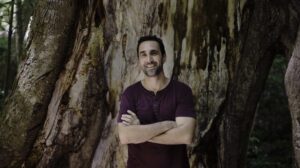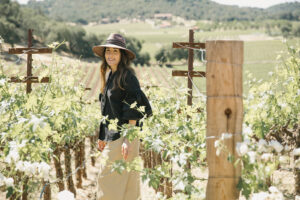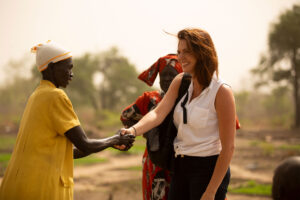
Masaya Co — Sustainable Furniture from Seed to Seat
MasayaCo is a sustainable furniture company on a mission to combat climate change through reforestation & sustainable design.
France
Gillian Russo June 20, 2019
Denis Vogade, president of Lothantique, grounds his company in values of simplicity, authenticity, and quality. Lothantique, a heritage french soap company, was born from the love of nature held by Vogade’s grandmother, who founded the brand 80 years ago as an essential oil production company. Now, Lothantique encompasses nearly a dozen brands of soap, candles, diffusers, and other bath and home products based on essential oils. The company has always been family-run throughout its evolution, and its commitment to careful crafting and social responsibility has never changed.
Vogade has expanded Lothantique from a small establishment in Provence, France, to a company with a global market. Vogade’s family and Lothantique’s philosophy, however, still remain rooted in Provence. As Vogade explains, this region and its people are known for being beautiful and genuine. He strives for the relationships between all aspects of the company – himself, his products, employees, consumers, and nature – to be equally meaningful, remaining reverent to his grandmother’s legacy.
Mood of Living: Where did you go to school?
Dennis Vogade: Sisteron, a small village of 8,000 people in Provence.
MoL: What was your first job?
D.V: I started immediately with Lothantique in 1987.
The alembic distillation site and process of Lothantique in its early days.
MoL: What inspired your grandmother, Josephine, to launch Lothantique? Tell us about her journey of success and why her values are still such an integral part of the company and your family today.
D.V: Josephine was an unbelievable and non-conformist woman. She was born in 1905. Her father died two months before her birth. She was the youngest from a family of five and the only girl! She came from a poor, but classic, farmer family from Provence, France. The family specialized in the culture of the lavender flower. Nestor, one of Josephine’s brothers, was a chemist and the pioneer of “the nose.” They used to cultivate and distill the lavender flowers to sell to the growing perfume industry in Grasse and Paris. Imagine the 1930s: the perfume industry was based only with natural ingredients coming from plants and animals. Josephine and Nestor developed the business using their own production of essential oils from flowers in Provence, as well as sourcing natural essential oils from around the world. There was a recession during World War II and the company was almost forced into bankruptcy. One cannot imagine what this generation lived through during this time! Nestor died during the war and Josephine returned to Provence, which was a free region during the war. Later on, during the 1950s, Josephine decided to create one of the first lines of cosmetic products based on lavender essential oils. Since then, we still use the same formula for our collection Lavande de Nestor. Josephine inspires us every day. She is the company hero. My life would not be the same without her.
MoL: You bought the company in 1987 at 23 years old, shortly after graduating from business school. How did you, at such a young age, turn the company into the global success it is today?
D.V: I took the company in the golden years! I’m kidding; however, in 1987, there was a company called L’Occitane that was very similar to ours. It was a small company of 20 employees, whereas Lothantique had only two! Now, 30 years later, I think Lothantique’s success has to do with Provence. It has become one of the trendiest, sought-after destinations in the world. This is in part because of the jet-set crowd going to the Cote d’Azure, the beauty of the natural landscape, and the authenticity of the region and its people. Our collections and production always respect Josephine’s core values and where they began: the family farm and Josephine’s appreciation of nature.
MoL: Do you still produce essential oils?
D.V: No, nowadays we don’t produce any essential oils, but we’re still using a lot. To begin, all fragrances contain some natural essential oils. Then we still have connections with producers from our area. Our area is one of the major places of production of lavender essential oils, which makes it easy to source and also respects our legacy.
Vogade with his sister Domy, who runs Lothantique’s marketing department.
MoL: When did you meet Gil Tani and how has he helped you grow the company?
D.V: I met Gil at the international home decoration trade show, Maison & Objet, in Paris in 1995. After a short time, I traveled to Toronto and we immediately felt like brothers. We started working together towards growing our business in Canada. We created Lothantique Inc. in 1998 to supply the North American market.
MoL: There is a strong line of women including your grandmother, mother, sister and wife in your life. How have these women influenced you as a business owner and shaped who you are as a man?
D.V: Yes, this is very true! I must admit that I really love to work with women. First of all, I believe that women are stronger in life than men. I believe that women are more serious, able to do many things day and night without complaining. This obligates me to be the very best that I can be every day. Hopefully, they can forgive me when I am nuts! In terms of the company and the products, the women never compromise, and this is excellent!
MoL: How do the women in your life play a role in the company?
D.V: I met my wife, Beatrix, 35 years ago when we were students in Montpellier, a lovely city in the south of France. She used to be in charge of research, development and quality control at Lothantique. In 2010, she created her own company, Saponalia, one of only four real Marseille liquid soap manufacturers in France. My sister, Domy, went to business school like me. She joined Lothantique in 1993 working in accounting. As the company grew, we hired her as a manager and she took over the marketing department.
Manufacturing process.
MoL: Your mother was the mayor of the village Chateauneuf Val Saint Donat in Provence between 1971 and 1983 and an advocate for women’s rights. Did she continue working in the company during this time?
D.V: Actually, our parents never really worked inside the company. One reason was because our father was a vineyard owner and very independent. The second reason was that Josephine got married to our grandfather, who was 15 years younger. He continued to run the company after Josephine’s death in 1981, waiting my arrival!
MoL: Is your company committed to social and environmental responsibility? If so, how?
D.V: Of course! How can we be not concerned by SER today? First of all, 95% of our employees are female. In early 2000, we created an agreement with our staff to try to help balance their private and professional life. This is why we decided to commit to a 35-hour week, which was not a legal obligation at the time. Our goal was to create the best way to organize our company to maintain business efficiency with our employees’ well-being in mind. Our work day begins at 8 a.m. and everybody leaves at 4 p.m. There is no work on Friday afternoons. We also provide a nursery with no fee, and our employees can leave during the work week for important appointments. I know that it can be shocking for North American people, but we find this to be a great benefit not only for our employees, but for our organization. The company is more productive and our staff is happier. This is a win-win situation. In terms of environmental responsibility, we have worked for many years to reduce the CO² emission by using only recyclable ingredients for all packaging and reducing superfluous packaging.
Soap manufacturing process.
MoL: What is your commitment to sustainability in the future? What are the challenges of enforcing these standards and ensuring high-quality products now that the company has become a global brand?
D.V: Fortunately, France (and Europe as a continent in general) is a country where the regulations around cosmetics and fragrances are the toughest and most complicated in the world, establishing a high standard for companies. As a small company who has a doctor in pharmacy on staff (Beatrix), we are at an advantage. We can control what our products are made of and maintain high-quality standards.
MoL: How do you support your local community?
D.V: We help a lot at associations in order to provide soap bars and liquid soap to homeless people. We are really involved in the development of our countryside, partnering with the local administration and political institutions.
MoL: What innovations are your company making in your field?
D.V: We are always researching the best and finest fragrances in the world.
Liquid soaps.
MoL: Do you partner or manufacture with other companies? What are the criteria?
D.V: The criteria to develop a business partnership is firstly the human relationship, and secondly, high-standard business values. Never money first…perhaps unfortunately for us! We created Amélie & Mélanie under the Lothantique brand. Christian Tortu and Miller & Bertaux are licenses of Lothantique.
MoL: What are some of your day-to-day challenges?
D.V: Our most important day-to-day challenges are trying to always make our customers happy with our products and our employees happy with their working conditions.
MoL: Where do you look for inspiration?
D.V: Mostly in the past, in our legacy.
MoL: Who is an influential figure in your life?
D.V: Olivier Baussan, the founder of L’Occitane.
The candle-making process.
MoL: What scent makes you happy?
D.V: Fresh and citrus.
MoL: Your favorite quote is:
D.V: From Gandhi: “If non-violence should be the humanity law, the future belongs to women. Then who are more capable to open the men’s heart than women?”
MoL: What is something you know now that you wish you knew before?
D.V: Humility and kindness.
MoL: Words of wisdom:
D.V: Confucius: “Never do to others what you hate for yourself.”
MoL: What advice can you give anyone interested in starting his or her own business?
D.V: Never give up! And learn from all kinds of networks.
Photography courtesy by Lothantique.

MasayaCo is a sustainable furniture company on a mission to combat climate change through reforestation & sustainable design.

April Gargiulo founded the sustainable skincare brand Vintner’s Daughter on principles of efficacy and sustainability.

Founder Treana Peake, supports artisan partnerships and funds development work through the Obakki Foundation.